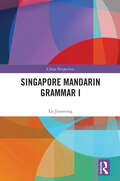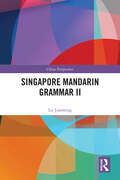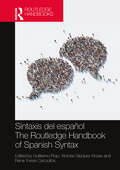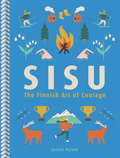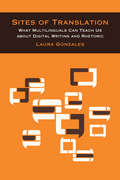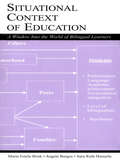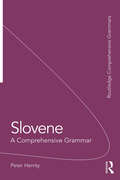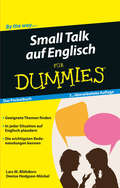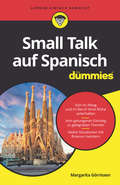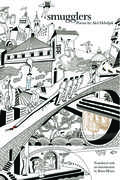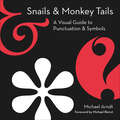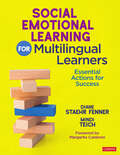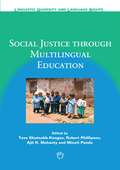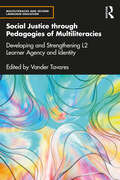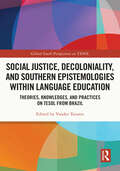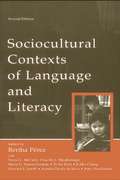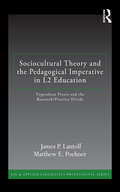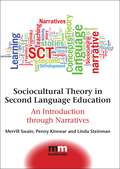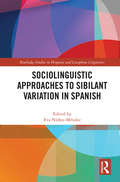- Table View
- List View
Singapore Mandarin Grammar I (China Perspectives)
by Lu JianmingAs the first volume of a two-volume set that presents a comprehensive syntactical picture of Singapore Mandarin, this title discusses the distinguishing characteristics of the Chinese language and describes the grammar of Singapore Mandarin. The book first provides an overview of the grammar of Singapore Mandarin and compares it with Chinese Mandarin (Putonghua). As a variety of Mandarin Chinese, Singapore Mandarin is also characterised by syntactic rules taking precedence over morphological rules. Therefore, it is argued that word order and functional words are specifically important in the study of Singapore Mandarin. Then the author explicates the properties and functions of the following nine grammatical components: the five most basic phrase types, word classes, sentences, subjects and predicates, predicates and objects, predicates and complements, attributes and adverbials, complex predicate phrases, and prepositions and prepositional phrases. With rich and authentic language examples, the book will serve as a must-read for learners and teachers of Mandarin Chinese and linguistics scholars interested in global Chinese and especially Singapore Mandarin.
Singapore Mandarin Grammar II (China Perspectives)
by Lu JianmingAs the second volume of a two-volume set that presents a comprehensive syntactical picture of Singapore Mandarin, this title analyses various expressions relating to number, quantity, time and place, composite sentences and the characteristics and standardisation of Singapore Mandarin. The first two chapters discuss expressions of number, quantity, time and place in Singapore Mandarin and touch upon the differences in these expressions between Singapore and Chinese Mandarin (Putonghua). Composite sentences are then analysed, covering seven types of compound sentences and eight types of complex sentences, as well as connective words with a focus on conjunctions. The final part of the volume analyses the characteristics of Singapore Mandarin grammar compared with Chinese Mandarin, on the level of phrase, lexicon and sentence. From the perspectives of language contact, political and social contexts and bilingualism, it summarises the possible reasons for the differences between the two varieties of Chinese and points out primary challenges and major concerns of the standardisation of Singapore Mandarin. With rich and authentic language examples, the book will serve as a must read for learners and teachers of Mandarin Chinese and linguistics scholars interested in global Chinese and especially Singapore Mandarin.
Sintaxis del español / The Routledge Handbook of Spanish Syntax (Routledge Spanish Language Handbooks)
by Rena Torres Cacoullos Guillermo Rojo Victoria Vázquez RozasEl volumen Sintaxis del español/The Routledge Handbook of Spanish Syntax proporciona una visión general de los temas fundamentales de la sintaxis del español, basada en datos extraídos de corpus textuales, sensible a los fenómenos de variación y conectada con otros componentes de la lengua. La obra, escrita en español, reúne perspectivas teóricas diversas, elaboradas por un grupo internacional de lingüistas. Está dividida en seis partes y comprende 45 capítulos centrados en cuestiones teóricas, cláusulas, oraciones y estructuras supraoracionales, categorías verbales, frases y clases de palabras, variación y cambio sintácticos, así como acercamientos computacionales y sus diferentes aplicaciones. El volumen constituye una referencia fundamental para los investigadores al tiempo que proporciona una introducción accesible para estudiantes de la lengua y la lingüística españolas. Sintaxis del español / The Routledge Handbook of Spanish Syntax provides a comprehensive overview of topics in Spanish syntax, drawing on corpus-based data, incorporating variation, and connecting with other aspects of language. Written in Spanish, the volume brings together diverse theoretical perspectives from an international group of scholars. Divided into six parts, the book comprises 45 chapters on theoretical perspectives, clauses, sentences and (supra)sentential syntax, verb categories, phrases and word classes, syntactic variation and change, and computational approaches and their applications. This handbook is an essential reference for scholars and an accessible introduction for students of Spanish language and linguistics.
Sisu: The Finnish Art Of Courage
by Joanna NylundDiscover the Finnish quality of sisu and how cultivating it can help you lead a life of greater purpose and happiness.This ancient Finnish word describes an attitude of courage, resilience, grit, tenacity and perseverance. This key psychological competence enables extraordinary action in times of adversity. To have sisu confers a further dimension of doing so with honesty, integrity and humility.By cultivating sisu you can: Face life's challenges with courage and determination Enhance your wellbeing and find your focus Communicate confidently and resolve conflicts effectively Cultivate endurance and achieve your fitness goals Raise kind and resilient children Act with integrity and fight for what you believe inSisu is a universal trait. It may have been bottled and labelled by the Finns, but it is within reach of everyone. It lies within you, and you are very likely to have used it already.
Sisu: The Finnish Art of Courage
by Joanna NylundDiscover the Finnish quality of sisu and how cultivating it can help you lead a life of greater purpose and happiness.This ancient Finnish word describes an attitude of courage, resilience, grit, tenacity and perseverance. This key psychological competence enables extraordinary action in times of adversity. To have sisu confers a further dimension of doing so with honesty, integrity and humility.By cultivating sisu you can: Face life's challenges with courage and determination Enhance your wellbeing and find your focus Communicate confidently and resolve conflicts effectively Cultivate endurance and achieve your fitness goals Raise kind and resilient children Act with integrity and fight for what you believe inSisu is a universal trait. It may have been bottled and labelled by the Finns, but it is within reach of everyone. It lies within you, and you are very likely to have used it already.
Sites of Translation: What Multilinguals Can Teach Us about Digital Writing and Rhetoric (Sweetland Digital Rhetoric Collaborative)
by Laura GonzalesWinner of the 2016 Sweetland Digital Rhetoric Collaborative Book Prize Sites of Translation illustrates the intricate rhetorical work that multilingual communicators engage in as they translate information for their communities. Blending ethnographic and empirical methods from multiple disciplines, Laura Gonzales provides methodological examples of how linguistic diversity can be studied in practice, both in and outside the classroom, and provides insights into the rhetorical labor that is often unacknowledged and made invisible in multilingual communication. Sites of Translation is relevant to researchers and teachers of writing as well as technology designers interested in creating systems, pedagogies, and platforms that will be more accessible and useful to multilingual audiences. Gonzales presents multilingual communication as intellectual labor that should be further valued in both academic and professional spaces, and supported by multilingual technologies and pedagogies that center the expertise of linguistically diverse communicators.
Situational Context of Education: A Window Into the World of Bilingual Learners
by Mar¡a Estela Brisk Angela Burgos Sara Ruth HamerlaThis book gives educators important answers to the urgent question of how teachers and schools can facilitate language minority and immigrant students' progress in school. It offers an innovative and powerful method teachers and students can use to study the situational context of education, providing both the theoretical background and the practical tools to implement this approach. The situational context of education includes linguistic, economic, social, cultural, and political factors, as well as conditions, such as students' personal characteristics, family support, and quality of instruction. All of these factors influence the lives of students and their academic performance and contribute in many ways, some subtle and indirect, to making the educational experience more or less difficult for different students. The premise of the book is that objective study of the situational context of education by both students and teachers is beneficial because it leads to a more realistic view of how to facilitate students' progress in school. Designed as a text for graduate courses for preservice and in-service teachers working with students in bilingual, ESL, mainstream, and special education classrooms, the goal is to engage readers in learning not only from the literature but also from studying the situational contexts of their own students. The focus here is on the factors that affect language minority and immigrant students in the United States, but the framework is equally powerful for work with student populations in other social contexts. *The Introduction includes an overview of the theory behind the study of the situational context of education and the implementation of this approach; describes the context of the pilot lessons included in the book; and explains how to use the lessons detailed in later chapters. *Chapters 2-6 focus on different factors in the situational context of education: linguistic, economic, social, cultural, and political. A three-part structure is used: "Classroom Implementation" (a rich description of one lesson in a real classroom); "Context Variables" (a theoretical explanation of the specific factor the chapter addresses, providing the research basis for the sample lesson objectives ); "Doing Analysis of the Context" (several sample lessons for implementation). The lessons are addressed to the teacher, with detailed ideas on how to carry out the lesson and evaluate the students' understanding of the situational context. *Five Appendices provide helpful resources for the implementation of the lessons: an Annotated bibliography of relevant K-12 children's literature; Instructional Approaches; Scoring Rubrics for Content Objectives; Guidelines for a Contrastive Study of Situational Context; and Lesson Template. The lessons have been thoroughly field-tested with students and teachers. Because these lessons work on multiple levels, Situational Context of Education: A Window Into the World of Bilingual Learners benefits students from first grade through preservice and in-service teachers in university courses. Teachers get to know their students and their predicaments within the social context of the United States, and at the same time, the lesson activities have a great impact on the students in their classes. All are helped to achieve academically while gaining awareness of situational factors affecting their lives.
Slaves to Rome
by Myles LavanThis study in the language of Roman imperialism provides a provocative new perspective on the Roman imperial project. It highlights the prominence of the language of mastery and slavery in Roman descriptions of the conquest and subjection of the provinces. More broadly, it explores how Roman writers turn to paradigmatic modes of dependency familiar from everyday life - not just slavery but also clientage and childhood - in order to describe their authority over, and responsibilities to, the subject population of the provinces. It traces the relative importance of these different models for the imperial project across almost three centuries of Latin literature, from the middle of the first century BCE to the beginning of the third century CE.
Slovene: A Comprehensive Grammar (Routledge Comprehensive Grammars)
by Peter HerritySlovene: A Comprehensive Grammar is the most complete reference guide to the contemporary language. Key features of this new edition include: updated examples reflecting current usage, expanded discussions of particular areas of difficulty, a brief history of the language, dialects and register, clear distinction between written and spoken usage, new tables and charts for quick reference. The Grammar provides a jargon-free and systematic description of all parts of speech promoting an in-depth understanding of the Slovene language. Slovene: A Comprehensive Grammar is a key resource for linguists and students of Slovene at intermediate and advanced levels.
Small Talk auf Englisch für Dummies (Für Dummies)
by Denise Hodgson-Möckel Dr. Lars M. BlöhdornSie kommunizieren in Ihrem Beruf mit Geschäftspartnern aus anderen Ländern? Sie reisen viel und wollen ein paar Sätze parat haben, um mit Menschen auf Englisch in Kontakt zu treten? Das Pocketbuch »Small Talk auf Englisch für Dummies« hilft Geschäftsleuten und Reisenden, Small Talk auf Englisch über verschiedene Themen zu betreiben und dabei Kommunikationsklippen gekonnt zu umschiffen. Lars M. Blöhdorn und Denise Hodgson-Möckel bieten Ihnen verständlich formulierte Hinweise, praxisorientierte Beispiele und nützliche Hintergrundinformationen - damit wird Small Talk auf Englisch zum Kinderspiel.
Small Talk auf Spanisch für Dummies (Für Dummies)
by Margarita GörrissenBei Tapas und einem guten Rioja entspannt ins Gespräch kommen? Im Beruf durch nette Plauderei eine entspannte Atmosphäre schaffen? Bei einer Einladung die richtigen Begrüßungsworte finden? Mit diesem Buch gelingt es Ihnen! Lernen Sie spanische Vokabeln und Redewendungen für den Small Talk kennen. Erfahren Sie, welche Themen in Spanien oder Lateinamerika small-talk-tauglich sind und welche nicht. Lassen Sie sich Techniken zeigen, mit denen Sie ein Gespräch beginnen, aufrechterhalten und beenden. Und haben Sie vor allem eines: jede Menge Spaß beim Small Talk!
Smugglers
by Ales DebeljakThe poems in Smugglers move through rapid historical shifts and meditations on personal experience, exploring the depths and limits of comprehension through the people and geography of the Balkans. Ultimately, Aleš Debeljak's urban imagination creates a mosaic—intimate and historical—of a vanished people and their country. Every poem in Smugglers is sixteen lines long—four quatrains, a common form for Debeljak. This structural regularity is reinforced by a commitment to visual balance, with each poem working as a kind of grid into which the poet pours memories and associative riffs.From "Bookstore":At least you are blessed. Winter's here. In darkness, awakesince yesterday, I came to browse again through the titles of oldbooks, wobbly skyscrapers, writers of my youth and stiffened honey.No opening hours on the door, a minor poet with no womansits behind files in the front. I know him from whenwe all shouted in one loyal voice, collected works on salefor a handful of cents, read the holy Kapitallike zealots. Well, okay: not exactly all. Some of us tookanother road . . .Aleš Debeljak's books have appeared in English, Japanese, German, Croatian, Serbian, Polish, Hungarian, Czech, Spanish, Slovak, Finnish, Lithuanian, and Italian translations. He teaches in the department of Cultural Studies at the University of Ljubljana in Slovenia.Brian Henry is the author of ten books of poetry and won the 2011 Best Translated Book Award. He teaches at University of Virginia in Richmond, Virginia.
Smugglers
by Ales DebeljakThe poems in Smugglers move through rapid historical shifts and meditations on personal experience, exploring the depths and limits of comprehension through the people and geography of the Balkans. Ultimately, Aleš Debeljak's urban imagination creates a mosaic—intimate and historical—of a vanished people and their country. Every poem in Smugglers is sixteen lines long—four quatrains, a common form for Debeljak. This structural regularity is reinforced by a commitment to visual balance, with each poem working as a kind of grid into which the poet pours memories and associative riffs.From "Bookstore":At least you are blessed. Winter's here. In darkness, awakesince yesterday, I came to browse again through the titles of oldbooks, wobbly skyscrapers, writers of my youth and stiffened honey.No opening hours on the door, a minor poet with no womansits behind files in the front. I know him from whenwe all shouted in one loyal voice, collected works on salefor a handful of cents, read the holy Kapitallike zealots. Well, okay: not exactly all. Some of us tookanother road . . .Aleš Debeljak's books have appeared in English, Japanese, German, Croatian, Serbian, Polish, Hungarian, Czech, Spanish, Slovak, Finnish, Lithuanian, and Italian translations. He teaches in the department of Cultural Studies at the University of Ljubljana in Slovenia.Brian Henry is the author of ten books of poetry and won the 2011 Best Translated Book Award. He teaches at University of Virginia in Richmond, Virginia.
Snails & Monkey Tails: A Visual Guide to Punctuation & Symbols
by Michael Arndt"There are countless books that can teach you the alphabet, but almost none that focus on the tiny designs that run interference among the letterforms: those easily overlooked punctuation and typographic symbols. These symbols, as Michael Arndt proves in this beautiful and endlessly fascinating book, are absolutely indispensable to communication: punctuation turns words into sentences and language into meaning... From commas to semicolons, from slashes to asterisks, from guillemets to octothorpes (named, perhaps, after athlete Jim Thorpe), you’ll never look at punctuation the same way again."—Michael Bierut, partner, PentagramIn this show-stopping guide with more than 75 uniquely designed two-color spreads—a rollicking linguistic ride for fans of Eats, Shoots & Leaves and Just My Type—award-winning graphic designer Michael Arndt explores the typographic origins, names, and shapes of both common punctuation marks and symbols, as well as the proper and diverse usage of each.From the period to the question mark, the semicolon to the em dash, symbols and marks are an integral part of language. In graphically engaging spreads that utilize typography in an innovative way, Snails & Monkey Tails examines the evolution of these mighty linguistic tools—from the punctum, or point, created by an ancient scribe to the guillemet, used most commonly in lieu of quote marks by the French (and named in honor of a typographer Guillaume Le Bé). With verve and insight, Michael Arndt explains their proper usage and how they came to be universally accepted today. Snails & Monkey Tails—Snails (@); Monkey Tails (&)—is packed with intriguing facts, history, stories, and lore, as well as grammar, explaining it clearly and with examples. What is the purpose of the comma—perhaps the most used symbol in the English language—and what are the proper uses of the asterisk? Do quote marks go inside or outside punctuation? What about a quote within a quote—a quote from someone quoting someone else? How much space goes on either side of an ellipsis? What’s the difference between an en-dash and an em-dash? Complete with a listing of useful terms and clear diagrams for creating typographical marks and symbols correctly on both PC and Apple computers, Snails & Monkey Tails is essential for bibliophiles, writers, grammarians, graphic designers, typography enthusiasts, logophiles, and anyone with a passion for the written word.
So You Want To Be An Interpreter?: An Introduction to Sign Language Interpreting (Fourth Edition)
by Janice H. Humphrey Bob J. AlcornBob Alcorn and I began the first edition of this book in 1984 with a single goal in mind of conveying sign language interpretation as the captivating, challenging, exciting and critically important discipline that it is.
Social Emotional Learning for Multilingual Learners: Essential Actions for Success
by Diane Staehr Fenner Mindi TeichFoster multilingual learners’ academic success, wellbeing, agency, and belonging Though multilingual learners (MLs) comprise nearly 25% of the school-age population, the most widely-used social emotional learning (SEL) frameworks and programs lack an intentional focus on these students’ unique strengths and challenges. To foster MLs’ academic success and wellbeing, educators must consider students’ cultures, languages, assets, expectations, norms, and life experiences when integrating SEL practices. In this groundbreaking book, Dr. Diane Staehr Fenner and Mindi Teich break down how each of the five competencies in the Collaborative for Academic, Social, and Emotional Learning (CASEL) SEL framework can be implemented with ML success in mind. Staehr Fenner and Teich’s practical and engaging guide provides SEL considerations that are unique to MLs, relevant research, easy-to-implement educator actions, and tools to seamlessly integrate SEL practices into content and language instruction. Additional features include: Tools and practical strategies educators can apply immediately Programmatic and systemic considerations that impact SEL for MLs Examples of successful SEL strategies for MLs currently being used in classrooms Ample opportunities for reflection and application in each chapter Templates to prioritize and integrate SEL for MLs into teaching practices MLs thrive when they are validated and supported to achieve their goals, empathize with others, build relationships, and make responsible decisions. The essential actions presented in this guide will enable you–regardless of your role or prior experience with SEL–to empower MLs to achieve academic and lifelong success.
Social Emotional Learning for Multilingual Learners: Essential Actions for Success
by Diane Staehr Fenner Mindi TeichFoster multilingual learners’ academic success, wellbeing, agency, and belonging Though multilingual learners (MLs) comprise nearly 25% of the school-age population, the most widely-used social emotional learning (SEL) frameworks and programs lack an intentional focus on these students’ unique strengths and challenges. To foster MLs’ academic success and wellbeing, educators must consider students’ cultures, languages, assets, expectations, norms, and life experiences when integrating SEL practices. In this groundbreaking book, Dr. Diane Staehr Fenner and Mindi Teich break down how each of the five competencies in the Collaborative for Academic, Social, and Emotional Learning (CASEL) SEL framework can be implemented with ML success in mind. Staehr Fenner and Teich’s practical and engaging guide provides SEL considerations that are unique to MLs, relevant research, easy-to-implement educator actions, and tools to seamlessly integrate SEL practices into content and language instruction. Additional features include: Tools and practical strategies educators can apply immediately Programmatic and systemic considerations that impact SEL for MLs Examples of successful SEL strategies for MLs currently being used in classrooms Ample opportunities for reflection and application in each chapter Templates to prioritize and integrate SEL for MLs into teaching practices MLs thrive when they are validated and supported to achieve their goals, empathize with others, build relationships, and make responsible decisions. The essential actions presented in this guide will enable you–regardless of your role or prior experience with SEL–to empower MLs to achieve academic and lifelong success.
Social Justice through Multilingual Education
by Robert Phillipson Tove Skutnabb-KangasThe principles for enabling children to become fully proficient multilinguals through schooling are well known. Even so, most indigenous/tribal, minority and marginalised children are not provided with appropriate mother-tongue-based multilingual education (MLE) that would enable them to succeed in school and society. In this book experts from around the world ask why this is, and show how it can be done. The book discusses general principles and challenges in depth and presents case studies from Canada and the USA, northern Europe, Peru, Africa, India, Nepal and elsewhere in Asia. Analysis by leading scholars in the field shows the importance of building on local experience. Sharing local solutions globally can lead to better theory, and to action for more social justice and equality through education.
Social Justice through Pedagogies of Multiliteracies: Developing and Strengthening L2 Learner Agency and Identity (Multiliteracies and Second Language Education)
by Vander TavaresSocial Justice through Pedagogies of Multiliteracies explores the ways in which pedagogies of multiliteracies can be used to promote and achieve situated forms of social justice, especially for minoritized L2 learners.This edited collection focuses on pedagogies of multiliteracies that seek to develop and strengthen L2 learner identity and agency within and outside formal educational contexts in bilingual, multilingual, multimodal, community, language, and teacher education. The volume contextualizes agency and identity around questions, ideologies, and issues related to language, gender, sex, sexuality, body, race, and ethnicity. Contributions illustrate the design and implementation of pedagogies of multiliteracies through a diverse range of modalities and settings: linguistic landscapes, graphic novels, picturebooks, photovoice, text, and imagery through instructor- and student-developed materials. The volume acknowledges, enacts, and builds upon the responsibility of L2 educators to develop pedagogies of multiliteracies that reflect the life experiences, identities, and needs of minoritized L2 individuals in the curriculum in order to realize the social justice aim of L2 education.Social Justice through Pedagogies of Multiliteracies will be of interest to L2 researchers, teachers, and teacher educators.
Social Justice, Decoloniality, and Southern Epistemologies within Language Education: Theories, Knowledges, and Practices on TESOL from Brazil (Global South Perspectives on TESOL)
by Vander TavaresWith a strong focus on decoloniality and social justice, this volume brings together critical theories, concepts, and practices on TESOL from multiple Brazilian perspectives. The chapters showcase the work of teachers and teacher educators in confronting sociopolitical issues in Brazil, including in the domains of democracy, language education, and knowledge production, as well as prevailing issues within TESOL itself. Contributions stem from an eclectic range of analytical orientations that reflect ontological and epistemological diversity while demonstrating why, where, and how TESOL is done in Brazil. In doing so, this volume also establishes a place for Southern voices to be heard in the move toward challenging complex and long-standing issues of representation, marginalization, and exclusion that have traditionally characterised North-South relations in TESOL as a field. This volume seeks to promote Southern-based conversations about decoloniality and social justice in TESOL and will be of direct relevance to graduate students, researchers, and scholars in the field of TESOL and foreign language education.
Social Variation and the Latin Language
by J. N. AdamsLanguages show variations according to the social class of speakers and Latin was no exception, as readers of Petronius are aware. The Romance languages have traditionally been regarded as developing out of a 'language of the common people' (Vulgar Latin), but studies of modern languages demonstrate that linguistic change does not merely come, in the social sense, 'from below'. There is change from above, as prestige usages work their way down the social scale, and change may also occur across the social classes. This book is a history of many of the developments undergone by the Latin language as it changed into Romance, demonstrating the varying social levels at which change was initiated. About thirty topics are dealt with, many of them more systematically than ever before. Discussions often start in the early Republic with Plautus, and the book is as much about the literary language as about informal varieties.
Sociocultural Contexts of Language and Literacy
by Bertha Pérez Howard L. Smith Teresa L. McCarty Lucille J. Watahomigie To Thi Dien Ji-Mei Chang Aurelia Dávila Amy NordlanderSociocultural Contexts of Language and Literacy, Second Edition engages prospective and in-service teachers in learning about linguistically and culturally diverse students, and in using this knowledge to enrich literacy learning in classrooms and communities. The text is grounded in current research and theory that integrate sociocultural and constructivist concepts and perspectives and provide a framework teachers can use to develop strategies for teaching reading, writing, and thinking to diverse students. The focus on English literacy development does not imply advocacy for "English only" or ESL as the primary mode of literacy instruction. Rather, the authors take the position that learners need to develop literacy in their native language and that the concepts and skills learned in developing the native language create a foundation of strength from which students can develop English literacy. Part I introduces relevant research and language learning theories. Part II provides research reviews and information about literacy learning within specific culturally and linguistically diverse communities. The chapters in Part III challenge the reader to view the multiple social, intellectual, cultural, and language differences children bring to the classroom as an opportunity for learning and building on the diversity among students. Activities and suggested readings at the end of each chapter involve readers in reflection, observation, meaning making, and the construction of application processes for their new understandings. New in the Second Edition:*updated research and theory on multilingual and second language literacy;*a focus on the interpretation of these research findings to make them useful for teachers and teacher educators in understanding and articulating the research bases for literacy practices; *attention to current intensely debated issues, such as standards, the phonics movement, and high-stakes testing; and*new activities and suggested readings.
Sociocultural Theory and the Pedagogical Imperative in L2 Education: Vygotskian Praxis and the Research/Practice Divide (ESL & Applied Linguistics Professional Series)
by James P. Lantolf Matthew E. PoehnerExplicating clearly and concisely the full implication of a praxis-oriented language pedagogy, this book argues for an approach to language teaching grounded in a significant scientific theory of human learning—a stance that rejects the consumer approach to theory and the dichotomy between theory and practice that dominates SLA and language teaching. This approach is based on Vygotsky’s sociocultural theory, according to which the two activities are inherently connected so that each is necessarily rooted in the other; practice is the research laboratory where the theory is tested. From the perspective of language education, this is what is meant by the ‘pedagogical imperative.’ Sociocultural Theory and the Pedagogical Imperative in L2 Education• Elaborates a new approach to dealing with the relationship between theory and practice—an approach grounded in praxis—the dialectical unity of theory and practice• Presents an analysis of empirical research illustrating praxis-based principles in real language classrooms • Brings together cognitive linguistics and sociocultural theory ─ the former provides the theoretical knowledge of language required of praxis and the latter furnishes the theoretical principles of learning and development also called for in a praxis approach• Offers recommendations for redesigning teacher education programs Its timely focus on the theory-practice gap in language education and its original approach to bridging it put this book at the cutting edge of thinking about Vygotskian sociocultural theory in applied linguistics and SLA.
Sociocultural Theory in Second Language Education: An Introduction Through Narratives
by Merrill Swain Penny Kinnear Linda SteinmanIn this accessible introduction to Vygotskyian sociocultural theory, narratives illuminate key concepts of the theory. Intended for graduate and undergraduate audiences, this textbook includes controversies in the field, questions for collaborative discussion and provides references to important work in the literature of second language teaching, learning and research.
Sociolinguistic Approaches to Sibilant Variation in Spanish (Routledge Studies in Hispanic and Lusophone Linguistics)
by Eva Núñez-MéndezSocial processes and the nature of language variation have driven sibilant variation across the Spanish-speaking world. This book explores the current state of Spanish sibilants and their dialectal variations. Focusing on different processes undergone by sibilants in Spanish (e.g., voicing, devoicing, weakening, aspiration, elision) in various geographical areas and language contact situations, each chapter offers an analysis on a unique sociolinguistic case from different formal, experimental, and data-based approaches. The opening chapter orients the reader with an overview of sibilant system’s evolution, which serves as an anchor to the other chapters and facilitates understanding for readers new to the topic. The volume is organized around three thematic sections: part one, Spain; part two, United States; and part three, Central and South America. The collection includes research on dialects in both Peninsular and Trans-Atlantic Spanish such as Jerezano, Caribbean Spanish in Boston and New York City, Cuban Spanish in Miami, Colombia-Barranquilla Spanish, northern Buenos Aires Argentine Spanish, and USA heritage Spanish, among other case studies. This volume offers an original and concise approach to one of the most studied variables in Spanish phonetics, taking into account geographically-based phonetic variation, sociolinguistic factors, and various Spanish language contact situations. Written in English, this detailed synthesis of the wide-ranging geolinguistic features of Spanish sibilants provides a valuable resource for scholars in Hispanic studies, linguistics, Spanish dialectology and sociolinguistics.
